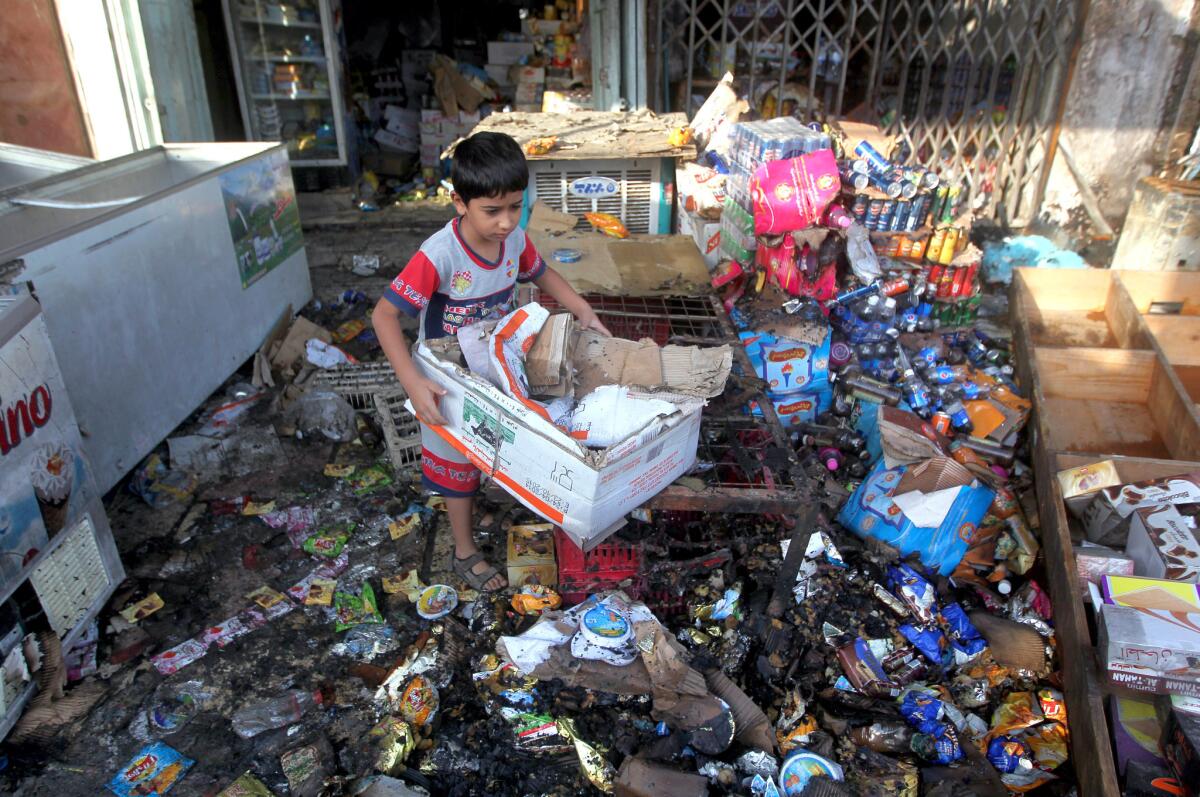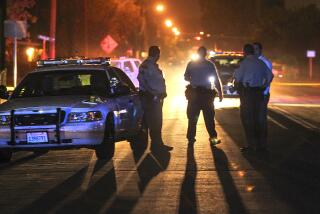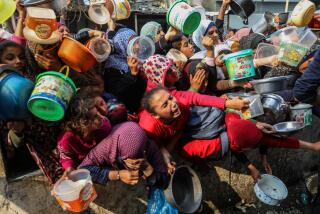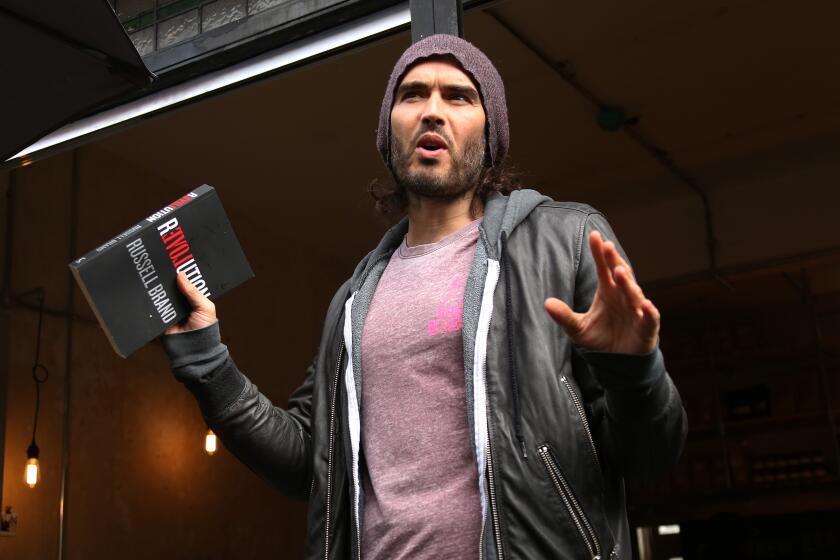Perspective: The dehumanizing of Iraqis is the main ‘American Sniper’ issue

The three-car caravan was headed to a funeral, everyone dressed in their Friday best. It was warm outside, as Baghdad often is in the fall, causing their crisp shirts to wilt and sweaters to itch. The men argued over who they’d pick for their soccer dream team, the kids played games on their dads’ smartphones.
The cars were stuffy inside, packed with way too many people. Adults wedged in sideways, kids plunked on laps. Packed in there tighter than carry-on luggage, my family knows how to fill a car.
Eight to nine of them can squeeze into the average five-seat sedan — a shape-shifting gene passed from generation to generation. Or maybe it’s just that we’re Iraqi, meaning stubborn. If something doesn’t fit, we make it.
But that ride would be the last for many of them. They were killed in a suicide bombing while attending that funeral in western Baghdad. Three generations wiped out in a split second. Old men, middle-aged fathers, kids so young they had their baby teeth.
I got the news at home in Los Angeles via Facebook, from relatives who’ve scattered across Iraq and the Middle East after the 2003 invasion. We grew up miles and cultures apart, me here in the U.S., most of them in Iraq, but we came to know one another on family summer vacations in smoldering hot Baghdad.
Over and over again, I imagine the hours before that blast, what they were doing before they became casualties of war, extremism or whatever justification was used in the name of such a brutal act.
There were no major news reports regarding the October massacre, no CNN “BREAKING” banners. It was barely mentioned in news roundups of atrocities in Iraq that day: ISIS advances, explosions and more civilian casualties in towns I’ve never heard of.
Massacres there don’t make the news here anymore, even though last year an estimated 17,000 civilians were killed in Iraq, making it the third bloodiest year since the war started 12 years ago. Clearly, Baghdad is not Paris. In the wake of the war, violence is to that region what sun is to Southern California — a constant presence.
But even during the height of our involvement in Iraq, the media never really did get a narrative down about how to cover the loss of Iraqi life.
Maybe we never understood how to cover that side of the conflict because we weren’t sure about where we stood on it during the invasion — are they victims, supporters, enemies, collateral damage? And as with Vietnam or Afghanistan, our motives heading into war seemed just as murky as the outcome.
It’s no wonder the heroic and clear-cut narrative of Clint Eastwood’s drama “American Sniper” has won over war-weary audiences.
A larger problem
Based on a memoir by the late sharpshooter and Navy SEAL Chris Kyle (played by Bradley Cooper), the film follows the sniper through four tours in Iraq, where he eventually sets a record for the highest number of “confirmed kills.”
Hunkered down on crumbling rooftops in Fallujah, Sadr City and Ramadi, the stoic Texan picks off the enemy with an accuracy that borders on supernatural.
The authenticity of the film has been challenged (critics say some of the claims in Kyle’s book aren’t true), and Eastwood has been called out for celebrating a sniper as a hero. Detractors say it glorifies murder. Supporters of the film say these critics are unpatriotic.
But the bigger problem here is that the Iraqis in Eastwood’s production are mere props, grizzled monsters who torture children with drills, swarthy insurgents who proliferate like cockroaches, bumbling, hapless victims who can barely string a sentence together let alone protect themselves.
Their foreign “chatter” (harshly spoken Arabic) is alienating, and their values are not like ours. Would you send your child to his death in the name of blowing up convoys or hide a cache of weapons under his bed? The Iraqis here do.
Plus, their faith is downright spooky. In “American Sniper” the call to prayer — a sound more commonplace than car alarms in the Muslim world — is foreboding, shorthand for bad things to come.
By the time our on-screen hero refers to the Iraqis as “savages,” the film has already made that point about 10 times over.
If all of “American Sniper” were this lunkheaded, then the fact that its Arabs can’t even sip tea without looking like Satan’s henchmen could be passed off as an expected part of one more ham-fisted war movie. But given the care the film takes in depicting Kyle’s own struggles with PTSD, his moral conundrums on the battlefield and his complicated life as a husband and father, the dehumanization appears more a plot strategy than an oversight.
Just as the evil-versus-good narrative helped sell the Bush administration’s invasion of Iraq, it’s also helped sell “American Sniper.” The film broke box-office records this month, taking in around $200 million.
Finally, a success story stemming from the Iraq war.
In remembrance
One boy killed in that suicide bombing a few months ago — my cousin’s son, Kareem — is pictured in a happier time on Facebook, an Angry Bird shirt stretched across his pudgy, pre-pubescent body. I imagine him arguing with his parents for more game time before bed: “One more minute, I need to get to the next level!”
He would have got along well with my son. Someone also posted a photo of his little brother, a crooked haircut likely done by his mother as he squirmed in the chair. He’s smiling, two front teeth missing, and that’s how he’ll stay forever.
Their story is unlikely to ever make it into a film, and that’s why I’m writing about these boys I never met.
Like Americans who perished fighting in the war, or European satirists shot down in their Paris offices, or Western journalists executed by ISIS, they need to be remembered too.
They were not savages. They were people who went to a funeral to pay their respects, to let the deceased know they hadn’t been forgotten. Don’t they deserve the same?
More to Read
Only good movies
Get the Indie Focus newsletter, Mark Olsen's weekly guide to the world of cinema.
You may occasionally receive promotional content from the Los Angeles Times.







